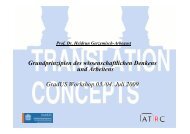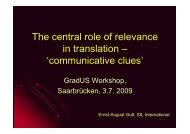Proceedings - Translation Concepts
Proceedings - Translation Concepts
Proceedings - Translation Concepts
You also want an ePaper? Increase the reach of your titles
YUMPU automatically turns print PDFs into web optimized ePapers that Google loves.
MuTra 2005 – Challenges of Multidimensional <strong>Translation</strong>: Conference <strong>Proceedings</strong><br />
Minako O’Hagan<br />
5.1 Digital textology and ludology perspectives<br />
Games text is non-linear and may appear in different parts of the game from different levels<br />
or as side games, such as mini-games which are a digression in relation to the main storyline.<br />
<strong>Translation</strong>s are affected by such an uneven structure particularly when the translator is<br />
required to work without actually seeing the game. Nevertheless, this structure can be likened<br />
to a hypertext arrangement where text is elastic and can be seen as a feature of new digital<br />
text whose context is rather fluid compared with conventional text. Another aspect which can<br />
be studied in relation to games text is the question of image-text hierarchy in game<br />
localization. Unlike screen translation subtitle norms where text is always subordinate to<br />
image, game localization allows an image to be modified to match the text, as illustrated in<br />
one of the examples discussed above. Consideration of the optimum factors in determining<br />
changes between text and image could provide an interesting area of study. The study of<br />
digital text in the form of digital textology could lead to the systematic analysis of translation<br />
strategies for games in relation to the new dimensions of digital text.<br />
Furthermore, as generally agreed among games researchers today, the analysis of games<br />
is considered incomplete if it is viewed only from a narrative perspective. This is resulting in<br />
a more holistic approach, involving both narratology and ludology dimensions (Newman<br />
2004; Wolf and Perron 2003). The ludology perspectives will also be beneficial for the study<br />
of game localization in eliciting what constitutes “gameplay experience” which the translator<br />
strives to recreate in a localized version.<br />
5.2 International game design<br />
This subject relates to the internationalization process in GILT practice. While some technical<br />
aspects of the internationalization process are well explored and can be standardized to some<br />
extent, truly international design is currently out of reach (O’Sullivan et al 2004). In<br />
particular, some Japanese games pose an interesting dilemma between the call for<br />
domestication (e.g. adjustment of the source culture-specific nonverbal cue with the shaking<br />
head to match the “no” answer in the English convention) and at the same time the need to<br />
retain the original feel by deliberately foreignizing it (e.g. "thank you" as the lover's last word<br />
may be more in keeping with the Japanese character showing a particular cultural trait, thus<br />
becoming an attraction point for the international audience). Given the fact that the Japanese<br />
RPG genre has established itself internationally almost because of its Japanese appeal<br />
(Thomson 1999), it is a factor in localizing certain Japanese games. Similarly, as evident in<br />
the rationale behind the International version, the Japanese players in turn deliberately seek a<br />
global touch through playing a version which is partly in English. These considerations, plus<br />
country-specific age rating and censorship requirements make the international design of<br />
games a complex but worthwhile topic to pursue.<br />
5.3 Fandom<br />
The extent of the potential impact of fans is a prominent factor shared between video games<br />
and such genres as Anime and Manga. In the advent of the Internet, the feedback from fans on<br />
newly released games is almost immediately broadcast on a worldwide basis. This includes<br />
comments on the quality of translation and localization, and such feedback can sometimes<br />
have significant commercial influence. For example, Square Enix, the developer and the<br />
publisher of Final Fantasy games, decided to undertake localization in-house based on the<br />
negative feedback received from some fans on its first localized effort with FFVII which had<br />
been produced using the outsourcing model (Mangiron private communication 2004). The<br />
83
















